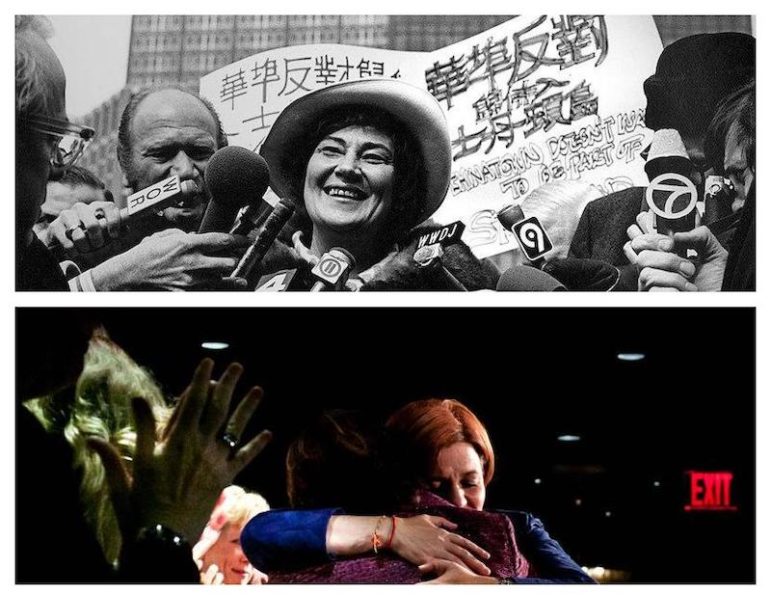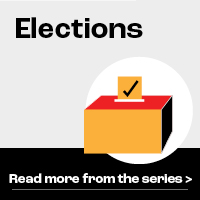There appear to be more serious female candidates in the field than the city has ever had.

Jeffry J. Iovannone/Adi Talwar
Rep. Bella Abzug, who made the 1977 Democratic primary ballot, and Christine Quinn, then the City Council Speaker, on an unsuccessful primary night in 2013.By officially entering the 2021 mayoral campaign last Thursday, nonprofit executive and single mom of two Dianne Morales made history. Or, to put it more accurately, she joined her fellow female mayoral candidates in making history together.
The Democratic mayoral field now has more serious female candidates than in any previous cycle. In addition to Morales, there is Maya Wiley, the civil rights activist and one-time counsel to Mayor de Blasio, former Sanitation Commissioner Kathryn Garcia and Loree Sutton, a psychiatrist and retired Army general who once served as the city’s commissioner of veteran’s services.
While there is a long road to the Democratic primary in late June, it is very likely there will be more than one woman on the primary ballot for the first time ever. This year will see the advent of ranked-choice voting, which provides a strategic rationale for candidates to stay in the race even if they face unfavorable odds against the full field. It will also feature a newly generous rate for public matching funds, making it easier for outsider candidates to mount robust campaigns.
A series of pioneers
Women have been regular participants in New York City mayoral contests for more than four decades, but almost always as a lone female amid a field of men.
Rep. Bella Abzug was the first woman to make the Democratic primary ballot, in 1977. The next mayoral race saw Mary Codd, a Liberal candidate, become the first woman to be on the general-election stage.
In 1985, two women vied with Ed Koch—Liberal Carol Bellamy and Republican Diane McGrath, who was the first woman to receive a major party mayoral nomination in the city—but neither won much more than 10 percent of the vote. (Bellamy, it’s worth noting, was the first female citywide official: She won City Council president—the forerunner to today’s public advocate post—in 1977.)
Brooklyn District Attorney Elizabeth Holtzman considered running for mayor in 1989 but ran for city comptroller instead and won, making her the first woman to hold that citywide job. No women mounted major mayoral races in 1989 or 1993 but in 1997 Ruth Messinger, Manhattan’s borough president, became the first Democratic mayoral nominee. Messinger lost to Rudy Giuliani but did receive nearly 550,000 votes, more than male mayoral nominees Fernando Ferrer in 2005, William Thompson in 2009 or Joe Lhota in 2013.
Women placed third in the 2005 (Manhattan Borough President C. Virginia Fields) and 2013 (Council Speaker Christine Quinn) Democratic races, and in 2017, Nicole Malliotakis was the Republican nominee. (When Assemblywoman Malliotakis joins Congress in January, six of the 13 House districts covering parts of New York will be represented by women.)
A big field allows a closer look?
This year, besides Garcia, Morales, Sutton and Wiley, there are six major male candidates in the race: City Comptroller Scott Stringer, Brooklyn Borough President Eric Adams, former city and federal housing Commissioner Shaun Donovan, Citigroup executive Ray McGuire, ex-Marine and entrepreneur Zach Iscol and City Councilmember Carlos Menchaca. Perhaps the presence of multiple serious female candidates isn’t surprising given that big pool. But after women’s profile in the City Council shrank dramatically in 2017, it seems significant that there will likely be more than one woman on the mayoral debate stage.
If nothing else, the presence of multiple woman in the mayoral race will be important precisely because it will discourage media voices like yours truly from pigeonholing one as the “female” candidate.
Indeed, the large and diverse mayoral field will make it hard for any simplistic labels to stick: Morales and Wiley along with Adams and McGuire are Black. Morales and Menchaca are both Latinos. Menchaca and Sutton are both gay. Sutton and Iscol both served in uniform and both Stringer and Iscol are Jewish.
Hopefully, all the identity crossovers will allow closer assessment of candidates’ qualifications and platforms.
Morales, for one, wants to use land banks and land trusts to create more social housing, promote worker cooperatives and public banking and create a separate first-responder department for quality-of-life and mental-health problems.
Wiley has called for police reforms, unionizing gig workers, addressing shortcomings in special education and buying properties left vacant or financially unstable by COVID-19 to use for housing.
Garcia offers problem-solving experience from her time overseeing sanitation and stints running NYCHA and the city’s pandemic food-distribution system.
Sutton elevates climate change as an issue and calls for pairing “sanctuary city” policies with advocacy for national immigration reform.
The other races
Three of the four female candidates—Morales, Sutton and Garcia—have appeared on the WBAI Max & Murphy Show co-hosted by City Limits. Wiley has been invited but not yet appeared.
It does not look like there will be any women contesting the other citywide offices: Public Advocate Jumaane Williams is not term-limited and so will attract few rivals, and Councilmember Helen Rosenthal dropped out of the comptroller’s race.
There are, however, serious female candidates for borough president in Brooklyn (Assemblymember Jo Anne Simon) and the Bronx (Assemblymember Nathalia Fernandez and Councilmember Vanessa Gibson).
The field for Manhattan District Attorney includes multiple women—Tahanie Aboushi, Liz Crotty, Diana Florence , Lucy Lang, Eliza Orlins and Tali Farhadian Weinstein—and the 51 Council races will feature dozens.










3 thoughts on “Women Have Already Made History in the 2021 Mayoral Race”
Kathryn Garcia appears to be a sensible ‘nuts-and-bolts’ kind of candidate. Her admiration of Ed Koch shows voters she understands the importance of NYC’s beleaguered middle class. She needs to ramp up her campaign and become more visible immediately.
NYC is behind other cities politically – we’ve never had a woman mayor. After term limits, city council will have only about 5 women remaining. How does ranked choice open up a pipeline for women to get elected to office in supposedly progressive NYC?
Gender is more important than qualifications? I don’t think so. I think Kathryn Garcia would be a great mayor because she’s an able administrator. That should be every voters only criteria for judging a candidate.